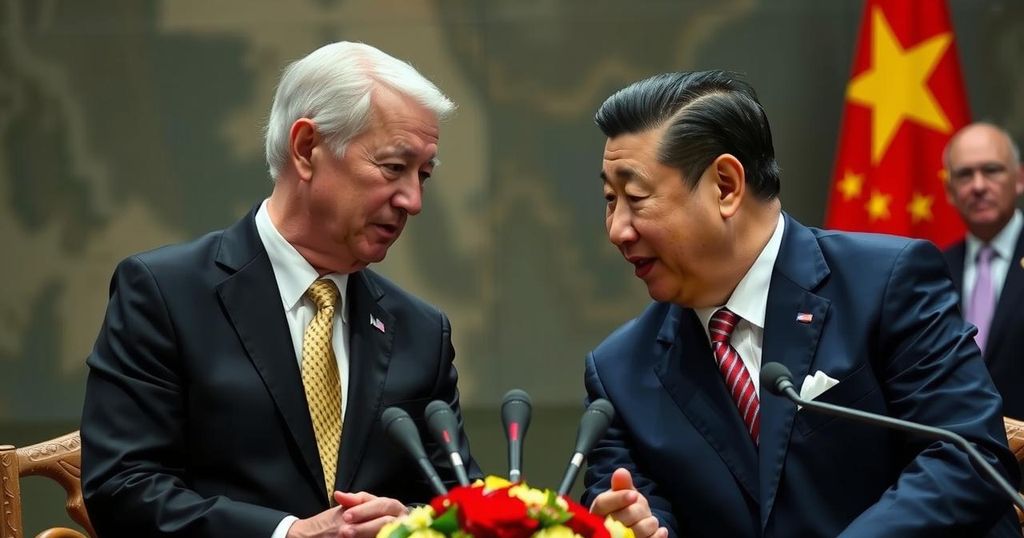Biden and Xi Scheduled to Meet at APEC Summit in Peru
U.S. President Joe Biden and Chinese President Xi Jinping will meet on November 16, during the APEC summit in Lima, Peru. The leaders will discuss significant issues including military communications, the fentanyl crisis, and trade policies. Biden will express concerns over China’s support for Russia and cyber-security threats. This meeting may be pivotal given the incoming Trump administration’s potential stance on China, highlighting the complexities of U.S.-China relations moving forward.
On November 16, U.S. President Joe Biden and Chinese President Xi Jinping are scheduled to meet during the 2024 Asia Pacific Economic Cooperation (APEC) summit held in Lima, Peru. This engagement marks their first in-person meeting since last year’s APEC summit in California and follows their 2022 G20 summit meeting in Bali. The leaders are anticipated to discuss areas of mutual cooperation, including the reestablishment of military communications, collaborative efforts against the global fentanyl crisis, and initial discussions regarding the management of risks associated with Artificial Intelligence (AI). During the meeting, President Biden will articulate significant concerns regarding China’s support for Russia amid its ongoing military conflict with Ukraine, and the deployment of North Korean troops aiding Russia. Furthermore, Mr. Biden is expected to raise issues regarding China’s trade practices, which he perceives as unfair and detrimental to American workers, while also addressing the matter of Chinese cyber-attacks on U.S. critical civilian infrastructure. The situation surrounding Taiwan and the South China Sea, along with human rights considerations, will also be foregrounded in their discussions. It is noteworthy that this meeting could represent the last direct interaction between Presidents Biden and Xi before the inauguration of President-elect Donald Trump in January. The anticipated Trump administration has indicated a potential shift towards a more confrontational stance on China, with key foreign policy appointments being made, including individuals known for their critical views on China. The complexity of the U.S.-China relationship is underscored, as effective management of issues such as cyber-security, military standoffs, and economic policies will remain crucial for future administrations. Furthermore, President Xi is expected to be evaluating the incoming administration’s potential impact on global trade, notably whether Trump will follow through on promises to implement significant tariffs on Chinese goods. This meeting will thus be pivotal in shaping the intricacies of future U.S.-China relations amidst a changing geopolitical landscape.
The forthcoming meeting between Presidents Biden and Xi takes place in the context of rising tensions between the United States and China, particularly concerning military activities, trade practices, and geopolitical stability. With the APEC summit serving as a backdrop for this dialogue, both leaders are faced with the challenge of addressing persistent issues stemming from their respective nations. President Biden’s administration has approached China with caution, balancing cooperation in certain areas with firm stances on contentious issues. As President Trump prepares to assume office, the potential for a shift in U.S. policy towards a more confrontational approach has raised questions about future interactions with China. Thus, this meeting represents a critical juncture in international relations that could influence subsequent diplomatic dynamics.
In conclusion, the upcoming summit between Presidents Biden and Xi in Lima is critical for navigating the multifaceted relationship between the United States and China. Addressing major topics such as military communications, trade policies, cyber-security threats, and geopolitical conflicts is essential for both leaders. With the impending transition to a Trump administration, the trajectory of U.S.-China relations remains precarious, emphasizing the need for robust dialogue and cooperative engagement in addressing shared challenges.
Original Source: www.voanews.com




Post Comment